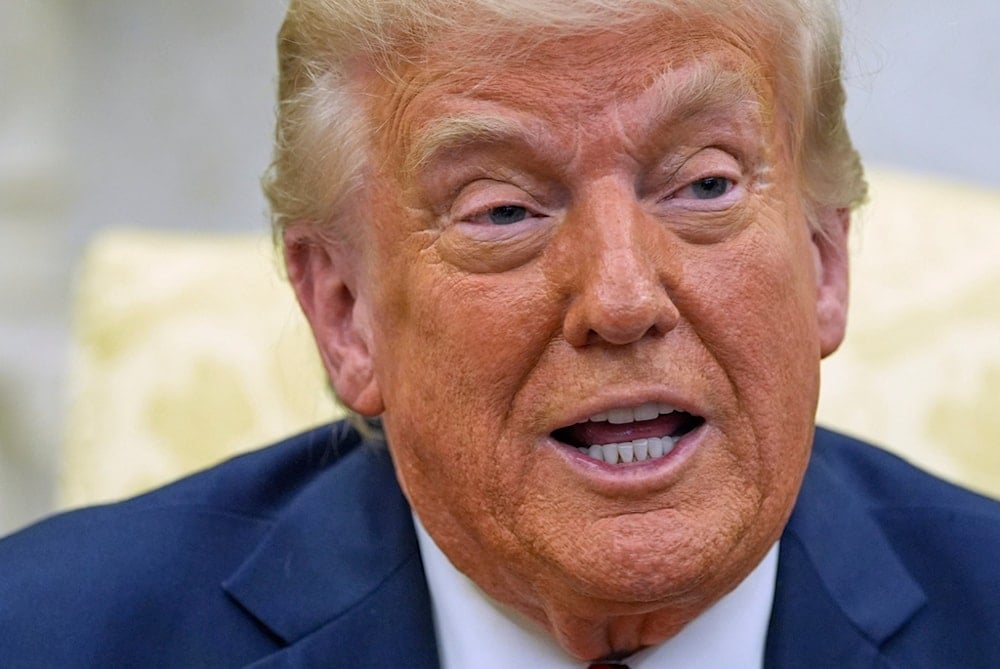Japanese investors dump $20bn in intl bonds amid Trump’s tariff shock
Japanese investors sold over $20 bln in international bonds as Trump's tariffs triggered global market volatility, marking one of the largest outflows since 2005.
-

US President Donald Trump speaks as he meets with Italy's Prime Minister Giorgia Meloni in the Oval Office of the White House, on Thursday, April 17, 2025, in Washington (AP)
Japanese investors offloaded more than $20 billion in international bonds after US President Donald Trump's tariff policies rattled global markets earlier this month.
The significant sell-off highlights how financial turmoil on Wall Street extended its reach worldwide.
Private Japanese institutions, including banks and pension funds, sold $17.5 billion in long-dated foreign bonds in the week leading to April 4, followed by an additional $3.6 billion in the subsequent week, according to preliminary data from Japan’s Ministry of Finance.
Wall Street turbulence triggers global financial reaction
Japan, which holds $1.1 trillion in US Treasuries, the largest foreign stockpile, plays a pivotal role in international bond markets.
Movements by Japanese investors are closely observed, often serving as an indicator of trends in US government debt.
This latest sell-off is one of the largest two-week outflows recorded since Japan began tracking such data in 2005.
The move came after Trump’s April 2 announcement of aggressive tariffs on what he dubbed "Liberation Day", which led to sharp declines in global stock and bond markets.
Wall Street’s S&P 500 index plummeted by 12% over four trading days following the announcement, before regaining some ground as Trump temporarily suspended most of the proposed tariffs for 90 days.
US Treasuries faced intense pressure during this period of volatility, with yields on 10-year notes experiencing the steepest weekly rise since 2001.
Although Japan’s Ministry of Finance did not specify which foreign bonds were sold, analysts suggest that much of the activity likely involved US Treasuries or US agency bonds, including government-backed mortgage securities.
Tomoaki Shishido, senior rates strategist at Nomura Holdings, noted, “A substantial proportion of [Japan’s] selling is probably either US Treasuries or US agency bonds.”
He added that the sales may have stemmed from Japanese pension funds rebalancing portfolios or financial institutions such as banks and life insurers managing their interest rate risk.
Analysts weigh in on the bond sell-off
Beyond Japan, sales by US asset managers and the unwinding of leveraged positions by hedge funds also contributed to the broader sell-off in Treasuries.
Still, the scale of Japanese investors' withdrawals underscores the global impact of Wall Street’s instability triggered by Trump’s tariffs.
The rapid exit from international bonds by Japanese investors reveals the sensitivity of global financial markets to US policy shifts and Japan's crucial role in maintaining market balance.
Similarly, Chinese clients are scaling back their holdings of US Treasuries in favor of European debt, as trade tensions and economic uncertainty under Trump prompt a reassessment of overseas investments, according to Deutsche Bank AG.
“We have observed some diversification away from the US dollar in Chinese investors’ portfolios,” said Lillian Tao, head of China macro and global emerging market sales, in an interview.
She noted that Chinese interest in alternative markets, particularly in Europe, has gained momentum.
Tao highlighted that European high-quality bonds, Japanese government bonds, and gold are emerging as preferred alternatives to Treasuries among Chinese commercial clients investing abroad.
Read more: US raises tariffs on Chinese goods to 245%

 3 Min Read
3 Min Read










